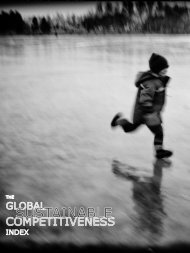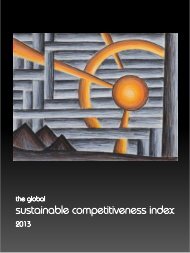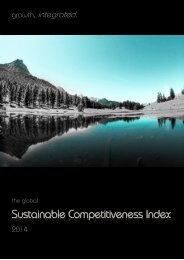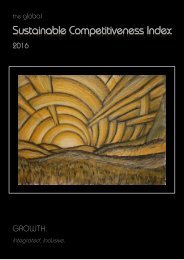The-Global-Sustainable-Competitiveness-Index-2015
Create successful ePaper yourself
Turn your PDF publications into a flip-book with our unique Google optimized e-Paper software.
Summary<br />
<strong>Sustainable</strong><br />
Competitive<br />
Natural<br />
Capital<br />
Social<br />
Capital<br />
Intellectual<br />
Capital<br />
Resource<br />
Management<br />
Governance Spotlight Data<br />
Social<br />
Capaital<br />
8 Spotlight: After the financial crisis<br />
<strong>The</strong> financial crises 2007/2008 translated into a global<br />
economic crises and caught many countries unprepared.<br />
Different countries have used different measurements to<br />
deal with the fall-out, declining economy, and increasing<br />
debt. We have therefore chosen countries that have<br />
adopted different answers to those challenges. <strong>The</strong><br />
research of the <strong>Sustainable</strong> <strong>Competitiveness</strong> <strong>Index</strong> is used<br />
to investigate whether sustainable competitiveness<br />
research can provide and insight as to why some countries<br />
have or are recovering better than others since the crisis.<br />
Benchmarking countries<br />
<strong>Sustainable</strong> <strong>Competitiveness</strong><br />
scores of the benchmark group<br />
Three countries (UK, Iceland, and Korea) have been chosen due to their very<br />
different approach after the crisis: saving at any cost to reduce deficits (UK),<br />
state-led investment program (Korea), and letting the banks into bankruptcy<br />
(Iceland), with the US, Germany, Japan, China and Greece serving as<br />
references.<br />
<strong>The</strong> UK was set on a strict austerity course (i.e. supporting the<br />
financial market and cutting tax for the well-off in the hope<br />
that this would lead to increasing investments and jobs<br />
while cutting all other cost in the hope to reduce budget<br />
deficits). Greece was forced on an ultra-austerity course by<br />
its European debtor countries - who want to recoup the<br />
money they gave Greece to bail out high-risk Greek<br />
investments of non-Greek European banks. South Korea<br />
and China both put forward significant investment<br />
packages in the face of economic crisis; while Iceland’s<br />
population refused to bail out the banks. <strong>The</strong> US, Germany<br />
and Japan used a set of policies trying to reignite their economies. All of the<br />
selected countries score above the average in the <strong>Competitiveness</strong> <strong>Index</strong>, but<br />
some countries – particular the US and the UK, are ranked considerably lower<br />
than in other competitiveness comparisons.<br />
Historic development of GNI per<br />
capita of the benchmark group<br />
Economic output development<br />
All of these countries have a considerable per-capita<br />
economic output and have more or less developed in<br />
parallel over the past 50 years. Of particular interest is<br />
Iceland’s spike after 2002 when the GNI output per capita<br />
doubled within a few year following the country’s<br />
metamorphosis into a single big investment bank and the<br />
steep decline when the bubble of trash-paper trading burst<br />
in 2007/2008. China is still only waking up to its ancient<br />
grandeur, and is likely to continue its growth into the future<br />
with improving infrastructure and education. However, in this particular context<br />
recent developments since the financial crisis are of more interest than the longterm<br />
developments.<br />
GNI development since the<br />
financial crisis (2008) – China<br />
more than doubled, the more<br />
developed countries only grew<br />
modestly or lost<br />
the sustainable competitiveness index <strong>2015</strong><br />
page 43








